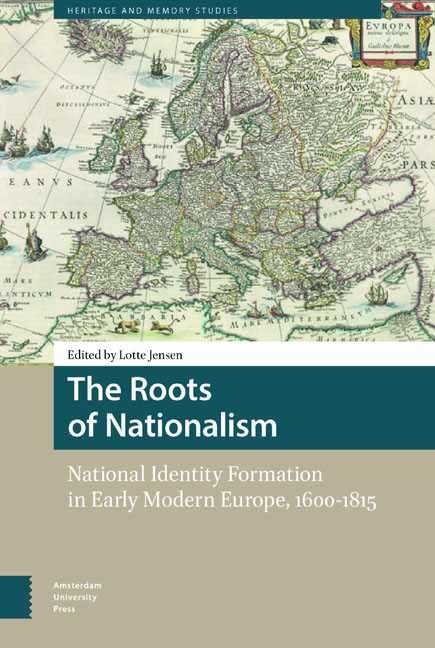Book contents
- Frontmatter
- Contents
- The Roots of Nationalism: Introduction
- Part One The Modernist Paradigm Contested
- Part Two The Genealogy of National Identity
- Part Three Negative Mirror Imaging
- Part Four Maps, Language and Canonisation
- Part Five Nation in the Age of Revolution
- List of Illustrations
- List of Contributors
- Index
7 - A Russia Born of War
Published online by Cambridge University Press: 03 February 2021
- Frontmatter
- Contents
- The Roots of Nationalism: Introduction
- Part One The Modernist Paradigm Contested
- Part Two The Genealogy of National Identity
- Part Three Negative Mirror Imaging
- Part Four Maps, Language and Canonisation
- Part Five Nation in the Age of Revolution
- List of Illustrations
- List of Contributors
- Index
Summary
As Romantic nationalism swept across Europe during the early nineteenth century, in Russia that sentiment exploded after Napoleon's invasion of 1812. While war can galvanize the national spirit of any people, to many Russians this was a conflict of a different order, as if Destiny itself had singled them out for a special test. One of history's greatest generals, an army numbering nearly 600,000, and a victory that would ensure French supremacy on the continent – all combined to create a scenario never seen before. Whereas Napoleon could marshal the resources of all his satellites and conquered territories, the Russians stood alone against this titan.
They passed that test with flying colours and in so doing changed the world. No other country had, by itself, repelled an attack by Napoleon and no one else had utterly crushed his army, once seen as invincible. The next year Russia crossed its border, uniting with Austria and Prussia in a crusade to liberate the continent that ended in Paris in 1814. Though Napoleon's defeat at Waterloo would come a year later, for Russians that was but the final act of his denouement. They had inflicted the mortal wound on their soil. If this was the age when other Europeans searched for national greatness, Russians need look no further. Theirs lay in a singular feat of arms, as given in the poignant summary by Denis Davydov, a flamboyant partisan leader: ‘now my head rises with pride, knowing that I am Russian’.
The enduring engine of that spirit comes from Leo Tolstoy's War and Peace. Whether as a novel, as a philosophical tract or as a historical study – he intertwined all three – ever since its publication in the 1860s, it has become Russians’ primary source to remember, to relive and to understand the significance of 1812. Nothing the poet writes can rival it as epic; nothing the scholar produces can displace its scenes and characters as icons of that feat. In fact, its grip on the Russian collective imagination has been so strong that the novel transcends itself as fiction. Tolstoy's contemporary and fellow novelist, Ivan Turgenev, wrote that out of more than ‘hundreds of essays on ethnography or history’, this work was the ‘faithful representation of the character and temperament of the Russian people’.
- Type
- Chapter
- Information
- The Roots of NationalismNational Identity Formation in Early Modern Europe, 1600–1815, pp. 153 - 166Publisher: Amsterdam University PressPrint publication year: 2016
- 2
- Cited by



